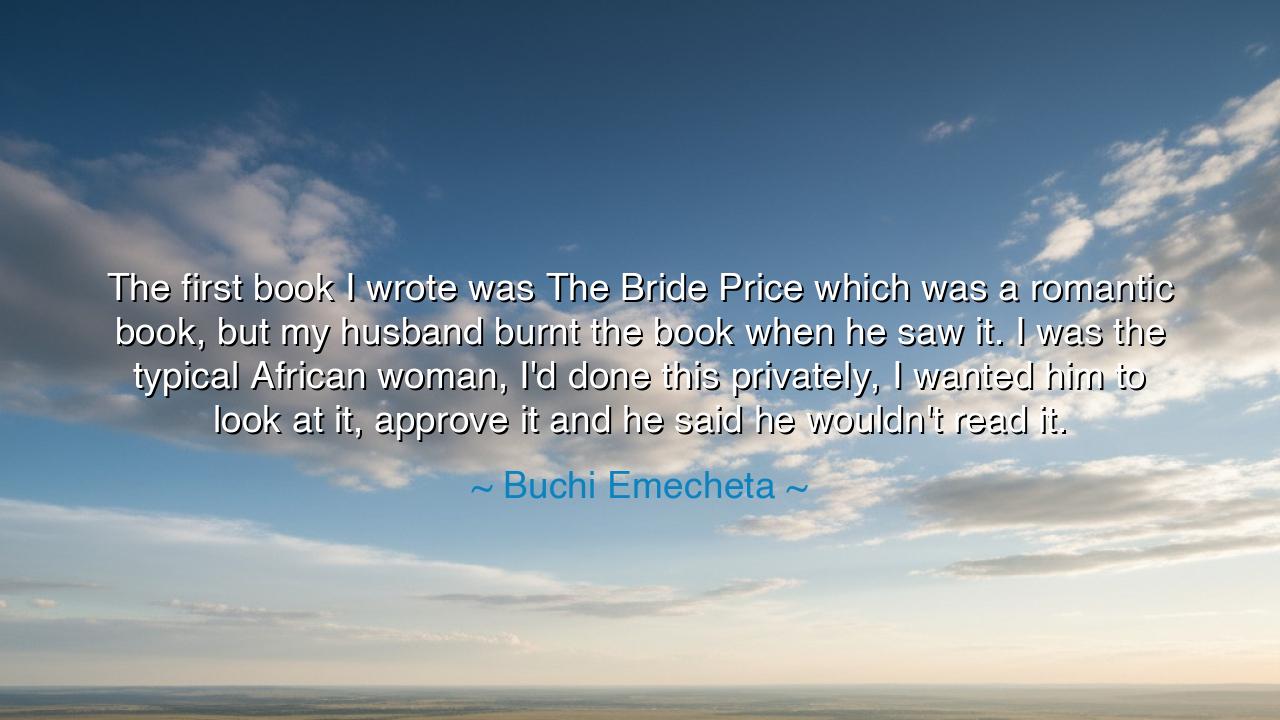
The first book I wrote was The Bride Price which was a romantic
The first book I wrote was The Bride Price which was a romantic book, but my husband burnt the book when he saw it. I was the typical African woman, I'd done this privately, I wanted him to look at it, approve it and he said he wouldn't read it.






Hear the voice of Buchi Emecheta, who bore her truth with courage: “The first book I wrote was The Bride Price which was a romantic book, but my husband burnt the book when he saw it. I was the typical African woman, I’d done this privately, I wanted him to look at it, approve it and he said he wouldn’t read it.” In these words lies the pain of a woman’s spirit crushed, yet not extinguished; the fire of creation stifled, yet destined to blaze again. It is the story of an artist silenced by the hand closest to her, and yet it is also the story of her rising, a testimony to endurance against fire both literal and figurative.
The origin of these words lies in Emecheta’s own life, as a Nigerian-born writer who came to London in the 1960s. Burdened with poverty, hardship, and an unsupportive husband, she struggled not only for survival but for the right to give voice to her inner world. Her first work, The Bride Price, told a story that was deeply romantic, yet rooted in the cultural struggles of her people. Instead of encouragement, she was met with violence—the manuscript itself reduced to ashes, as though her voice had no right to exist. In that act of burning, one sees the long shadow of patriarchy, the attempt to silence women, to deny them the authority to create, to think, to dream.
Yet this destruction was not the end. Like the mythical phoenix, Emecheta rose from the ashes of her burnt manuscript. She rewrote her book and went on to craft a career that would make her one of the most celebrated African writers of her time. The very fire that sought to consume her voice became the spark that hardened her resolve. What was meant to silence her instead revealed the unbreakable strength of her spirit. Her story is not just about literature—it is about the struggle of all who have ever been told that their dreams are unworthy.
Consider the example of Galileo, who faced condemnation by the authorities of his time for daring to speak the truth of the heavens. His writings were banned, his voice nearly silenced, but his ideas endured, carried forth by those who refused to let the flame die. So too with Emecheta—though her book was burnt, the truth she carried could not be destroyed. For words, once kindled, live not only on the page, but in the heart that conceives them. And a determined heart will always write again.
The deeper meaning of Emecheta’s words lies in the image of the “typical African woman” she describes—one taught to seek her husband’s approval, to work in silence, to surrender her labor of love to the judgment of another. But her story reveals the breaking of this chain. By choosing to write again, to publish, to declare her independence as a creator, she defied not only her husband but the cultural forces that sought to confine her. In this, her personal story becomes universal: a lesson for all who have been told to shrink, to remain silent, to accept the fire of others as final.
The lesson for us is clear: do not surrender your voice to the approval of those who cannot see its worth. Do not let the flames of doubt, rejection, or dismissal reduce your dream to ashes. If your work is destroyed, create it again. If your voice is silenced, speak louder still. Let your suffering be transmuted into strength, and your rejection into a rebirth. For true creation does not live in the approval of others—it lives in the persistence of the soul that refuses to die.
Therefore, children of tomorrow, remember the story of Buchi Emecheta. Guard the fire within you, even when others try to extinguish it. Share your work boldly, not timidly, for the world needs your vision. And if you find your manuscript burnt, your art dismissed, your dream scorned—know that this is not the end. Rise again, as she did, and let the very ashes bear witness to your resilience. For in the end, the fire cannot consume a spirit that is determined to shine.
Thus Emecheta’s words, born of pain, become a beacon: the world may burn your pages, but it cannot burn your destiny.






AAdministratorAdministrator
Welcome, honored guests. Please leave a comment, we will respond soon